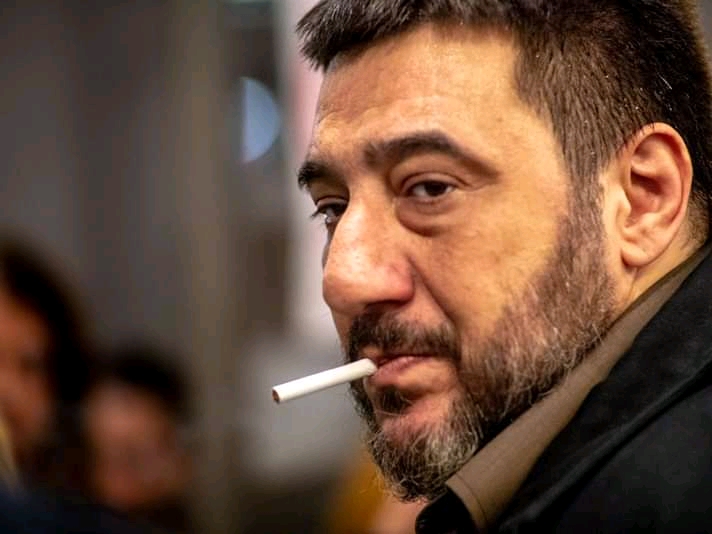In this contribution, Gianluca Solera pays hommage to the memory of Vaggelis Karageorgos, Greek journalist and political activist, who passed away prematurely last week. His profile offers the opportunity to raise questions on the art of politics and the left in the Mediterranean. The article was originally published on Gianluca’s blog.
Vaggelis Karageorgos died last July 22, 2019. He was my age and was surprised by the Angel of Death in his bed, when a heart attack made him prematurely leaving this Earth. I had met him for the first time at SabirFest 2016, and since then we remained spiritually close friends. Vaggelis was first of all a man of humor and empathy, who loved enjoying life. His last project was to open a Greek Taberna, for which he temporarily left journalism. Conviviality was for him a way to make people nearer. He was moreover a “political animal”: he had led the student and social struggles of the 80s and 90s in the lines of the revolutionary left, and later joined the Syriza Central Committee. Efsyn progressive newspaper he had been leading, as one of the editors-in chief, has supported our work for Mediterranean citizenship, and recently backed Maydan’s campaign for the Mediterranean, in view of last May’s European elections.
Vaggelis’ death leaves a vacuum of inclusive humanity and civic engagement on the side of the unluckiest. On the eve of the grand opening of his new Greek Taberna, I had promised him to “teach” how to make proper Italian-style coffee. I won’t be able any longer to fulfil my promise, and his remains lie now there, in Kokkinos Milos Cemetery, offering the by-passer a corner where to rest and question about himself and his own political dreams. Vaggelis left us a few weeks only after the loss of Syriza at the Greek parliamentary elections, held last July 7.
I have recently read an opinion by The Guardian’s columnist Gary Younge about : how is it possible that – when the Left wins elections – she cannot hold on to power[1]. This question is a fundamental one, because we all Europeans are facing the most important threat to our democratic system and social and political values ever since the end of the so-called Cold War. Our Southern European nations especially, who rose again on the ashes of fascism and embraced the road to democracy and social justice in the second half of the last century, are now threatened by the most diverse expressions of nationalism, populism or fascination for “rule and order”, which have been nurtured by an explosive mix made of the damages of economic austerity at any cost, on the one hand, ambiguous policies vis-à-vis the neighboring authoritarian regimes, and the inability to meet the challenge of refugees and migrants in a cohesive and inclusive manner, on the other hand.
Younge recalls that – according to the account of Yanis Varoufakis, the finance minister at the time of the bailout negotiations with the IMF and the EU – the Greeks had options, though it soon became clear to him that Tsipras never seriously intended to employ them. There were no guarantees they would have been successful; but once Tsipras’ ranks abandoned their own agenda, failure was certain. Either way, Syriza’s defeat was less a failure of left policies – which were never actually implemented – than of a left electoral strategy that had no plan B for the predictable obstacles it would face. On the other hand, neoliberal globalization has reduced the weight of nation states’ and their margin of maneuver, and therefore the significance of democratic legitimacy especially in socio-economic affairs.
Nationalism and related far-right doctrines preach the predominance of the national identity over universal human rights as the solution to the crisis, without really putting into question internal social inequalities and the rule of profit and capitalism. For the sake of national ideology and of their role as irreplaceable nation’s representatives, these groups are ready to give up with democratic rules and embrace the financial support and the ruling style of authoritarian regimes such as Russia or the Gulf States.
The challenge is so important for all of us that, if progressive parties fail in delivering, the road to power of camouflaged fascism in Europe wont’ have any more opponents.
The first and most difficult challenge of these leftist parties is coherence, and their capacity to put into discussion old-fashioned policies. In Italy, now that the Five Stars Movement reveled to be an ameba without political capacity to stand for what it was born, and that it has been eaten up in the public narrative by the Northern League, the Democratic Party is still sticking to an old-fashioned nineteenth century vision of development, by adhering to the plans of large-scale infrastructures such as the high-speed train link between Turin and Lyon, which is breaking apart communities in Piedmont, or supporting car industry and urban sprawl. Or, it is miles away from the debate on the ecological transition our economy and our towns would require now.
On the other hand, while I am writing, the Spanish parliament has just ended the second debate for the appointment of Socialist Pedro Sánchez as new head of government, where the non-agreement between Spanish Socialists and Podemos on ministerial posts has blown up the possibility of a progressive government, thus opening again the gate to new elections. Ant that, while Franco’s authoritarian and illiberal spirit is finding its way in more than a political party. And again, people won’t understand why they have to go to vote another time, and why so called progressive politicians are not able to join forces.
When that happened, and it happened in Portugal only, the concerned country experienced a new era of optimism and growth. End of 2015, Portuguese Socialist Party defied constitutional precedent by negotiating an anti-austerity pact with the radical Left Bloc (BE), the Portuguese Communist Party (PCP), and the Portuguese Greens. Since Socialist António Costa entered office in November 2015, Portugal has, for the first time this century, caught up with the rest of Europe in terms of economic growth and job creation.
State pensions, the minimum wage and public sector pay were increased, while cutting taxes and improving welfare benefits for the lowest-paid. Costa has achieved this at the same time as complying with the EU’s strict fiscal rules, which prohibit budget deficits of more than 3 per cent of GDP. Their challenge is now to reforming labour contracts, increasing industrial capacity and creating high-skilled jobs.
New Statesman magazine recalls that one of the strategic keys of the alliance, besides challenging the Austerity Dogma, was that BE, PCP and Greens parties hold no government positions, thus somehow “liberating them to condemn Costa’s administration when necessary and maintain credibility with their voter bases”[2].
I am not a political analyst, but I take the liberty to consider that we progressive and liberal citizens should expect that lessons are learnt, and that people like Vaggelis have not spent their life in a noble struggle for nothing.
I wish that electoral professionalism in the left ranks is definitely removed, so that the fate of an individual does not matter any longer more than the destiny of a country. Personalism is what helped characters like Berlusconi, then Renzi, then Salvini to impose their rule and reshape mentalities in my country.
I wish that divergences do not prevail over the commitment for a dialectic unity, when the threats and the challenges are so important for a nation or a community of nations such as Europe. There are still people seeking a change and who do not believe that my well-being depends on maintaining inequalities and rejecting the unluckiest, and these people are ready to offer their support provided that political representatives learn to make a step back for the sake of their community, and learn as well to take unpopular but decent and fair measures, even if re-election might be jeopardized. Politicians who are not able to think and act in this way, they are not useless: they are dangerous.
I wish that parties and social movements act together, not seeking to prove who is the most leftist and progressive among them. Political representation needs social mobilization, otherwise becomes pure populism and scenic theatrics, and fails in the power-game arena with international institutions and multinational economic forces. Syriza itself is the story of small leftist groups brought together by a will of unity and convergence. Even if Syriza failed because it did not implement its anti-austerity platform and did not seek for alternative receipts – as Varoufakis says – I do not wish to see in Greece the comedy of a divisive and desegregated panorama of so-called progressive groupings taking the stage as it happened in Italy in the last years.
I wish that the ecological transition becomes the central battle, what must bring thinkers, researchers, activists, councillors and economic players to talk to each other and radically question their paradigms. This is not the case yet in many Southern European countries, and often words are not followed by deeds, at least at the level of national, regional and local governments. Not only antifascism must be what reunites those who fear characters like Marine Le Pen or Viktor Orbán or the current Russian / American leadership, but also the urgency to stop the ecological disaster.
I wish that politicians and citizens are offered the opportunity to study and learn more about what they declare they are for. The propaganda of the nationalists is so effective because it shapes and targets external enemies (Brussels’ based institutions, the refugees, Islam) and externalize all inner conflicts and contradictions in an amazing well staged narrative and mediatic representation. All what is about learning more of the complexity of the contemporary world is put in the garbage can. The left did not do so much to change it. It is time to bring the regular citizen to learn, study and question issues in a rational way. It is a matter of not losing the critical spirit. Critical spirit is the last bulwark against stupidity, authoritarianism and homogenization.
Last but not least, I wish that humanity and a certain sense of sacrifice permeates the style of political engagement. Vaggelis was a master in that. I remember a joint dinner we had during SabirFest 2016, in the presence of Podemos’ Senator Pedro Arrojo and the Five Stars Movement’s politician Manlio Di Stefano, currently Under-Secretary of State at the Italian Foreign Office. The exchange was sometimes tough, but Vaggelis had his way to mock contradictory statements without offending the concerned person. And beyond ideological standings, he liked to investigate how much of humanity and compassion could still be detected in the facts and policies under debate. Humanity and compassion are more important than our own integrity and political positioning, and for the sake of mankind, we must be ready to make a step back, or question ourselves, or admit that we were wrong. This is what it means, “serving the people”. Many progressive characters declare they do so, and then they forget about it when their career is at risk, or when they shake hands with this or that little dictator or ruthless businessman. Vaggelis took the teaching of “serving the people” to the letter, and he opened a Greek Taberna. This was for me a major demonstration of wisdom.
“I only achieve simplicity with enormous effort”, wrote Brasilian writer Clarice Lispector. We need public figures who attempt to do such an effort, and this is one of the reasons why I will miss Vaggelis.
La Marsa, Tunisia, 25 July 2019.
[1] Gary Younge, “Syriza’s defeat shows the left needs a plan to hold on to power, not just win it “, The Guardian, 12 July 2019.
[2] Peter Wise, “Europe’s socialist success story: the strange rebirth of the Portuguese left”, New Statesman, 18 March 2018.




